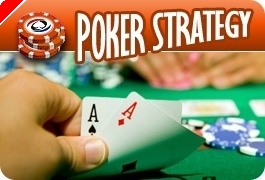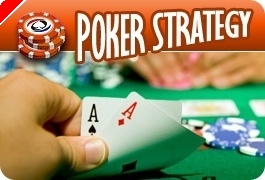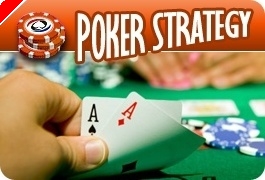Stud Poker Strategy: Playing on the Road

I've been staying and playing poker in Las Vegas. It's a long way from my home in Boston; I've been here for about a week now. It's longer than I normally stay – and it comes with certain risks to my game. Let me outline them and address how I compensate. (For a full rendition of my poker exploits feel free to check out my blog at www.houseofcardsradio.com.)
Playing in a place other than your home turf can be an exciting experience. I recommend poker travel to anyone who likes the game. There are many positives. You play against folks who don't know you or your game. You get to meet new people. You get to experience a different ways of doing what you like to do. All this gives you perspective on your regular poker game. How are you going to truly evaluate how your home room does things if you never see how it's done otherwise?
Still, there are some risks to your game. When you're away from home, especially in a gambling destination such as Las Vegas, Atlantic City, or more recently Mississippi, Oklahoma, or even Florida, there is a temptation to get caught up in the excitement of the gambling-rich environment. Las Vegas especially is geared to stimulate your gambling desires. You cannot escape the constant visual and audile cues to gamble it up. And, in a 24-hour city, you can always find a game.
I've also found that I have a desire to prove myself out here – prove myself to the other poker players I encounter; and prove myself to myself. I want everyone to know that I can beat the best. I'm not satisfied with the typically small incremental wins that make up my grindingly steady game at home. I can reinvent myself here as Pokerman, superhero of the tables. I'm more inclined to play bigger.
This is especially true at the World Series of Poker at the Rio. There are three places where cash games are played here. There's the regular poker room that has the games it spreads throughout the year – low-limit hold'em. Then, in the Amazon room where the big tournaments are held throughout the Series, there are two sections of cash games – the low-limit games as I'd find in the regular poker room, and then the big cash games. These are the $10/20 and $25/50 no-limit or pot-limit games, often modified with a third and bigger blind. Or, they're the $50/100-and-above limit games.
It's very easy in the seductive air of Las Vegas and the World Series to seek poker glory at the high-stakes games. "I'll just play really tight," you might think. Or "I can hold my own against those guys. I know how to play." And so you try, with a short bankroll, and maybe, if you actually thought about it objectively, poker chops not really ready for beating the best cash-game players in the world. This is surely a recipe for ruining your bankroll.
This is not to say that you shouldn't take a shot at high-limit action. Maybe you do have the game. Maybe you do have the bankroll. Who am I to judge? But I can tell you this: You should decide to play based on a rational understanding of your poker skills and bankroll, and not be led by impulse or ego. And that's the risk, that ego, opportunity, and desire will overwhelm your better judgment.
There are other risks to your game in a foreign, gambling-rich environment such as this. I've found that all of the poker stimulation hurts my already poor ability to get a good night's sleep. First, there's the temptation to try and cram as much poker into a limit period of vacation time. Hey, you're only at the Taj in Atlantic City or the Horseshoe in Tunica for a few days, you might think. You want to get in as much poker action as possible. So you play until 6:00 in the morning. But that's not all of it. It's not just staying late in a good game. The other end of the problem occurs when you finally go back to your room. All of the poker stimulation (and perhaps chemical stimulants like caffeine) make your sleep more fitful and less nourishing. I know from experience that even if I retire for the night at midnight, I don't sleep nearly as well on the road as I do at home. And so when I get up the next morning I am not nearly as refreshed as I normally would be.
This sleep deprivation also diminishes your game as it erodes your brain's abilities to make decisions. And that's what solid poker is all about – making good decisions.
I've noticed another problem in playing on the road that contributes to a diminishing of my poker skills: diet. First, there are the stimulants that many of us tend to take to keep our game sharp when we're at the table. You know them — the energy drinks fueled with guarana and caffeine. There are also the high-fat, high-carbohydrate, high-salt and high-sugar foods. They mess with our metabolism and sleep as well, if only because they are different from our regular diet (I suppose some folks eat like that all the time, but not me.)
In sum, you are getting into tougher fights with weaker weapons.
Prevention is simple, though admittedly not easy. Here's what I suggest:
1. Plan your play before you come out, when your brain, emotions, physiology are in their best condition. Think about what you'll do, where you'll play, and what you'll play. Include some non-playing activities as well, such as exercise. And then when you go on the road, generally stick to your plan.
2. Plan to sleep more than normal. I know that sounds like a major bummer – you're going away not to sleep but to play. Even so, an extra hour of rest can make your bottom line better.
3. Buy a case of water for your car and your person. Dehydration is one of the biggest risks when you travel – especially in Las Vegas. It's easy to forget about eating and drinking while you're caught up with the poker scene. If water is handy you're much more likely to drink it.
4. Buy some healthy snacks to carry around with you to the poker room. I buy bananas, plums, apples, raisins, and nuts. I find that eating them while I play keeps my energy and alertness higher and also diminishes the likelihood that I'll have unhealthy food.
5. Take frequent breaks from the table to evaluate your game. This isn't a guarantee that you'll be using sound judgment when you make that evaluation. But at least it gives you a shot of leaving a game where you're outclassed – either because you're against better players or because your typically better skills have substantially diminished.
6. Avoid the temptation of trying to earn back any losses by moving up in stakes at the end of your trip. Many gamblers ruin their ability to recover from a poker loss by making it catastrophic in an effort to get even in a rushed, big-stakes play. Don't do that. Stay within your normal comfort zone of stakes. And if you leave a loser, at least you'll be able to get back what you lost by good play in the future.
I love to play poker on the road. And I've found that I can make it both a profitable and enjoyable experience by taking the bankroll-protecting steps I've outlined above.








